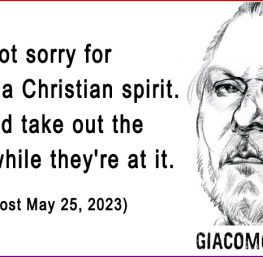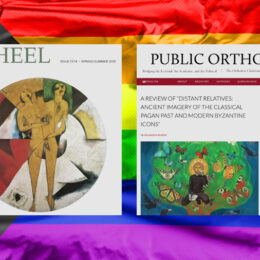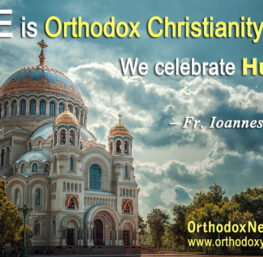Mara D. Bellaby Associated Press Writer Published: Jun 15, 2005
KIEV, Ukraine (AP) – Defying the Russian Orthodox Church’s stance, one of Ukraine’s top religious leaders said Wednesday he sees no obstacles to greater cooperation between the Orthodox Church and the Vatican.
The statement, which was made during an interview with The Associated Press, signaled yet another rift between Russia and the former Soviet republic of Ukraine, where pro-Western leaders came to power earlier this year.
The Moscow Patriarchate accuses the Catholics of encroaching on its territory and blocked the late Pope John Paul II’s long-held wish to visit Russia, the world’s most populous Orthodox nation.
Patriarch Filaret, head of the Ukrainian Orthodox Church’s Kiev Patriarchate, said the churches have much in common and should cooperate in emphasizing the importance of the family and moral values.
“Today the task and mission of Christian churches – Orthodox, Catholic, Protestant – is to support moral values and support spirituality and morality in European civilization,” Filaret told AP. “We don’t need to be afraid of Rome, or the Greek Catholics.”
The new pope, Benedict XVI, already has declared a “fundamental commitment” to heal the divide between the Roman Catholic and Orthodox churches.
Unifying the two churches is “desirable but today it is not realistic,” Filaret said, but he added that greater cooperation is possible.
The World Council of Churches, the Geneva-based fellowship that includes the Orthodox churches, welcomed Filaret’s comments and said he hoped the Roman Catholic Church and the Russian Orthodox Church would be encouraged work for fuller unity.
“To hear those comments, that the Orthodox churches are feeling confident they can address bigger issues (is an indication of) mending fences,” the WCC leader and Methodist pastor, Rev. Samuel Kobia, told the AP in an interview in Rome.
The Roman Cathololic Church is not a member of the WCC but participates on several levels. Kobia was in Rome to meet with Pope Benedict XVI on Thursday.
Cardinal Walter Kasper, a German prelate who is president of the Vatican’s Pontifical Council for the Promotion of Christian Unity, declined to comment on Filaret’s remarks, noting that he had not yet read them.
But he noted, in a telephone conversation with AP in Rome, that Filaret “doesn’t speak for the other patriarchs.”
The Kiev patriarchate is outside the fold of the Moscow patriarchate, which has been among the Vatican’s harshest critics on contentious issues like the Vatican’s alleged evangelism in the former Soviet Union and property disputes.
The Russian church has accused Catholics of poaching souls on its traditional territory, sparking tension between the churches since the 1991 Soviet collapse. An estimated 600,000 Catholics reside in Russia, and the Vatican insists it is only looking out for its flock.
Russian Orthodox Patriarch Alexy II, in a newspaper interview published Wednesday, said the Vatican would have to make the main effort to heal troubled relations between the two churches.
“We warmly welcome recent statements by Pope Benedict XVI in which he spoke of Christian unity and the need for concrete steps to improve ties between the churches. We hope that such steps will be made by the Catholics in order to change for the better Orthodox-Catholic relations,” he told the Russian government daily Rossikaya Gazeta.
The Ukrainian church split into three parts after this ex-Soviet republic gained independence, in part due to the refusal of the Russian Orthodox patriarchy to cede control over this mainly Orthodox nation of 48 million.
The Kiev patriarchate, which claims independence from Moscow and boasts more than 2,700 congregations throughout Ukraine, warmly welcomed a visit by Pope Benedict’s predecessor John Paul II in 2001.
The Russian Orthodox Church strongly objected to the papal visit, complaining in part that the presence of Eastern Rite Catholics in western Ukraine was an infringement on their traditional territory. The Moscow Patriarchate of the Ukrainian Orthodox Church, which is under the Russian Orthodox Church, also opposed the papal visit.
Eastern Rite Catholics, or Greek Catholics, follow Orthodox rituals but pledge allegiance to the pope, causing some Orthodox to accuse them of attracting believers who would otherwise be Orthodox. Filaret said, however, that he has good relations with the Greek Catholics, and that questions of property – one of the most decisive issues – have almost been resolved.




I’m a little confused by the tone of this story, empahsizing as it does a conflict between the Ukrainian and Russian Orthodox. After all, just three entries below this Fr. Hans has posted a story about Patriarch Alexy also calling for cooperation with Catholics on cultural issues facing Europe.
Is there really a conflict between what the Russian and Ukrainian Churches are saying, or just a difference in emphasis?
The so called “Kievan Patriarchate” is sort of like an “Orthodox” version of protestantism. It isn’t recognized by Moscow. I’m not sure if any other Orthodox Patriarchates actually recognize it either. It was formed after the collapse of the Soviet Union when, I believe, the former Metropolitan of the Ukrainian Church decided to declare himself “Patriarch”. Its not suprising that this “Patriarchate” would try to gain close ties with the Vatican. They are hungry for any kind of legitimacy at all.
Stephen, in principle there should be an independant Ukrainian Orthodox Church if there is an independant Ukrainian country. If that is the case, merely not being Russian does not make one Protestant. I know that the jurisdictional issues are enormously complicated in that region, but we shouldn’t go so far as to virtually invalidate our fellow Orthodox brothers and sisters over it.
Keith, I agree that there is a need and some very good reasons to have an independant Ukranian Orthodox Church. I hope this works itself out over time. However, to proclaim oneself “Patriarch” seems a bit of a stretch. Not that it hasn’t been done before, but are the good reasons for having an independant Church worth the separation implied by grabbing it rather than being given it? I don’t think so.